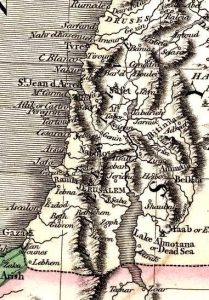Yesterday we discussed the connection between the ‘blessing of the rain in its season’ and its relationship to peace.
Today we will discuss the economic influences of this blessing and the climate conditions present in the land of Israel. First let’s have a look at the blessing:
“If you walk in my statutes and observe my commandments and do them, then I will give you your rains in their season, and the land shall yield its increase, and the trees of the field shall yield their fruit.” (Leviticus 26:3-4)
The ancient agriculture of the land of Israel during biblical times, unlike in many other places, was based on unirrigated crops. This means that most crops were dependent on the rain as the only source of water. Since the people of Israel wandered in the desert, and the only land they knew was Egypt, it was important to explain to them the unique conditions of the Land of Israel, which are quite different than Egypt:
“For the land that you are entering to take possession of it is not like the land of Egypt, from which you have come, where you sowed your seed and irrigated it, like a garden of vegetables. But the land that you are going over to possess is a land of hills and valleys, which drinks water by the rain from heaven.” (Deuteronomy 11:10-11)
Not just the quantity of the rains is important for this kind of agriculture, but equally important is the TIMING of the rain:
“The LORD will open to you his good treasury, the heavens, to give the rain to your land in its SEASON and to bless all the work of your hands.” (Deuteronomy 28:12)
The reason for this is the unique and diverse geographical climate of the small land of Israel which changes from one region to the other. In fact, the land of Israel is one of the only places in the world which has snowy mountains and green fields next to a sea and a desert!

It is truly remarkable that in in such small territory – the distance between the snowy mountains area and the desert is less than 100 kilometers {60 miles})! This one-of-a-kind nature phenomenon enables Israel to grow different kind of crops ALL year long and not just in one specific season like in other countries.
When one travels in Israel, one can see (and taste) the abundance and variety of different fruits and vegetables which grow all year long. Each kind of crop has its own season – due to the diversity of the geographical areas of the land.
However, the key for the cycle of crops growing is the rain IN ITS SEASON. Similar to a domino effect, if the rain does not come in its season (winter in Israel) it causes a chain reaction which can damage the entirety of the crops of the land – in ALL different regions.
One of the biggest fears of people was a rain NOT in its season, as recorded in the following verses in the Book of 1 Samuel:
“But if you will not obey the voice of the LORD, but rebel against the commandment of the LORD, then the hand of the LORD will be against you and your king. Now therefore stand still and see this great thing that the LORD will do before your eyes. Is it not wheat harvest today? I will call upon the LORD, that he may send thunder and RAIN. And you shall know and see that your wickedness is great, which you have done in the sight of the LORD, in asking for yourselves a king.” So Samuel called upon the LORD, and the LORD sent thunder and RAIN that day, and all the people greatly feared the LORD and Samuel.” (1 Samuel 12:15-19)
I would like to conclude with the very meaningful verses from Psalms:
“Those who sow in tears shall reap with shouts of joy! He who goes out weeping, bearing the seed for sowing, shall come home with shouts of joy, bringing his sheaves with him.” (Psalm 126:5-6)
